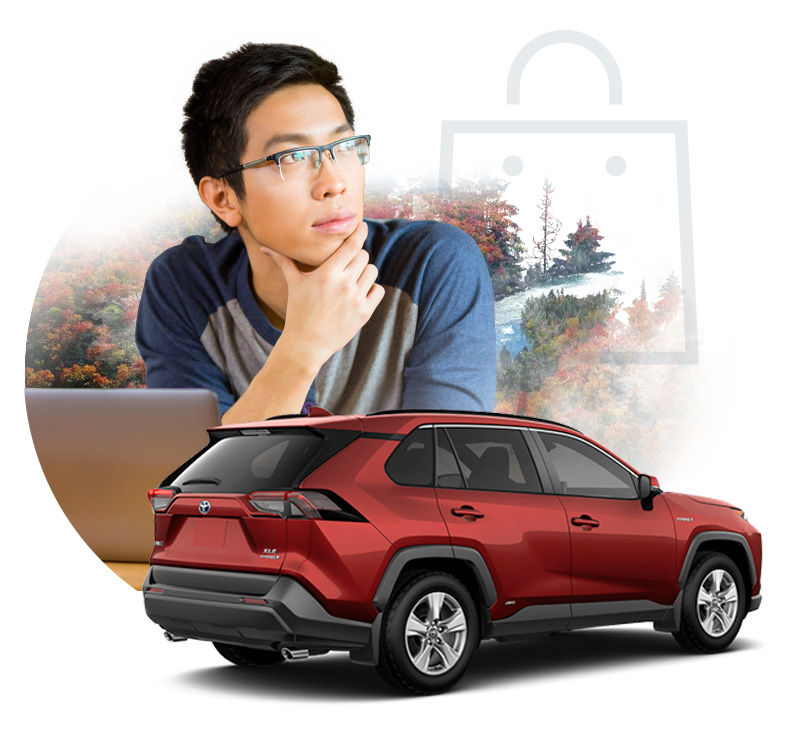

Get Your Instant Estimated Trade-In Value
Type Your Year, Make, Model, VIN ...
How Can We Help You Today?

It’s all about pride. The pride we take in selling and servicing Toyota brand vehicles, some of the most reliable, safe and innovative on the road today. The pride we take in ensuring your experience here at Bolton Toyota exceeds your expectations, from first appointment through final delivery...and beyond. The pride we take in giving back, particularly our direct involvement in Bolton/Caledon events that support our entire community.

Car buying has changed. So BoltonToyota.ca is built to meet your evolving needs with a robust, yet intuitive online experience. Browse, save, track and manage the purchase process in multiple ways.
|
|
Shop according to your budget |
|
|
Get your financing |
|
|
Complete the transaction at our dealership |

The vehicle you drive now has value. Bolton Toyota Pre-Owned experts have a keen eye for that value. Armed with real-time market pricing technology, we can offer top value for your vehicle, whether you trade-in on a new purchase or simply sell it to us.
|
|
Trade-in on a purchase or simply sell us your vehicle |
|
|
Receive top value for your vehicle |
|
|
Get an evaluation in under 60 seconds |

As technology advances, expectations evolve. Dilawri is laser-focused on perfecting your shopping experience, be it online, in-store or at your home/office. As Canada’s largest automotive group, we boldly lead automotive retail forward, providing more ways to drive your deal and take delivery than any other retailer. Bolton Toyota is a proud member of Dilawri.

Welcome to Bolton Toyota, your number one dealership for the purchase of a new or pre-owned Toyota vehicle in Bolton, Ontario. We offer the entire collection of brand-new Toyota vehicles starting with the brand’s fuel-efficient sedans, spacious and versatile SUVs, and of course its entire lineup of brand-new trucks and hybrid vehicles as well. Very few automakers have such an extensive lineup of new vehicles as Bolton Toyota, and we look forward to helping you find the perfect vehicle for your needs today.
As a proud member of the Dilawri Group of Companies, we offer you all of the benefits of working with Canada’s largest dealership network. Not only do you enjoy the best possible rebates and services, but we also offer you a wide range of other advantages.
Toyota new vehicles have continuously managed to stand out in their segments by combining incredible reliability and safety with a perfect blend of sportiness and comfort. From our spacious SUVs to our efficient hybrids to our rugged trucks to our best-selling sedans, nothing beats Toyota’s ability to provide consumers with more value and more of the features they want. Let’s take a look at some of the Toyota models that stand out in the industry.
Completely redesigned from the wheels up this year, the Toyota RAV4 is an amazing sport utility vehicle that shines in so many areas. It is more spacious than many other compact SUVs while offering advanced standard safety technology.
The big surprise with the Toyota Corolla’s recent redesign was the addition of a hybrid model, but the Corolla overall has dramatically improved. It is more spacious, more fun to drive, more fuel-efficient and has more powerful engines. It’s the no-compromise solution for compact sedan buyers.
The Toyota Camry outshines many of its rivals by providing more space than its competitors, and more refinement as well. Both its four-cylinder and its V6 engine have more power than other similar engines, and it also comes with a hybrid version to truly give you the best blend of performance and fuel economy.
The Toyota Highlander is another stand out model in its class. Completely redesigned, it stands out by being spacious and versatile for large families with three rows of seats, but it also is a very comfortable and refined SUV on the road. It gives you all of the benefits of owning an SUV without the hassle. It’s fun to drive, easy to park, and it has a lot of room left in the trunk even if all three rows of seats are up.
The Toyota Prius has been a pioneer of not only hybrid vehicles, but you could also argue that it ushered in a new segment of the automotive industry by providing consumers with a look into the advantages of electrification. The Prius has been redesigned many times since it came into the market and revolutionized the industry back in 1998, but it has always stayed true to its original mission which is to provide all the benefits of a hybrid without making drivers feel like they have to compromise.
There are plenty of other new Toyota vehicles in stock at Bolton Toyota. These include the Toyota Yaris, the Toyota Avalon, and the Toyota C-HR SUV as well as the Toyota Sienna minivan. Bolton Toyota offers you hundreds of Toyota Tundra and Tacoma pickup trucks in stock.
At Bolton Toyota, you will find a large Toyota service department to keep your vehicle running like new, and a parts department that can get you any replacement parts that you need. Our large Body Shop has aluminum experts and is the preferred shop of most major insurance companies. We also repair all makes and models and have become the number one body shop for most manufacturer’s warranty repairs.
To learn more about our Toyota trucks, our new and pre-owned Toyota vehicles, and our dedicated after-sales services, come and visit us today at Bolton Toyota!